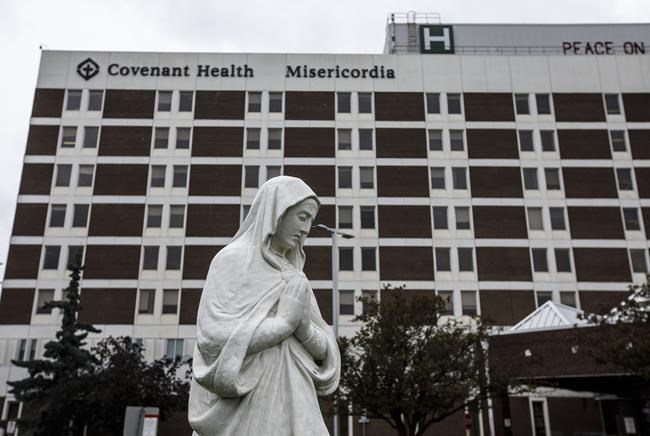EDMONTON — The head of emergency medicine for the Alberta Medical Association, Dr. Paul Parks, says major components of triage have already begun in Alberta — an assertion disputed by the province.
The dispute arose Friday as the Canadian Armed Forces prepared to bring in air transport and staff to deal with a COVID-19 crisis overwhelming Alberta’s hospitals.
The province has yet to formally invoke the triage policy, which would see doctors have to make on-the-spot decisions over who gets life-saving resources.
ButParks said it has become routine in hospitals in the last two weeks to have some critically ill patients — most of them unvaccinated COVID-19 cases — kept on main wards rather than in intensive care units on ventilators because they don't have the available intensive care ward staff.
That's on top of previously announced mass cancellations of surgeries, along with patient transfers, as doctors balance medical needs with available space, he said.
"We already are in positions in many hospitals across Alberta where the doctors know that it would be best for this patient to be in ICU and be on a ventilator, but we're not providing that option until they absolutely deteriorate to the point of crashing," Parks said Friday.
"We already are implementing some of these things that are drastic, and we wish we never would have.
"People will suffer and will die by this."
Alberta Health Services said in a statement: "We acknowledge that we are operating at a reduced standard of care, however, safety remains at the forefront of all decisions.
"Any patient who requires mechanical ventilation is currently able to receive it."
Parks said it's not at the point where doctors must make on-the-spot, life-and-death decisions. But he said that's not far away and, when it comes, the second stage of triage will follow quickly, including making those same decisions about children.
Alberta Health Services said triage will only be invoked if all efforts to increase intensive care capacity are exhausted.
There are 368 intensive care spaces with 304 patients, most of whom are critically ill with COVID-19, and most of them unvaccinated or partially vaccinated.
Alberta normally has 173 intensive care spaces but has been converting other spaces, including operating rooms, into ad hoc critical care wards to meet COVID-19 demand.
Alberta has more than 20,000 active COVID-19 cases and is seeing well over 1,000 new cases a day.
Dr. Verna Yiu, head of Alberta Health Services, said Thursday a key reason intensive care wards have not been overwhelmed is because enough COVID-19 patients are dying to free up bed space.
The number of COVID-19 deaths has been on the rise.
There were 29 fatalities reported Tuesday, 20 more Wednesday and 17 Thursday. More than 2,600 people have died in Alberta since the pandemic began.
Premier Jason Kenney has asked other provinces and the federal government for emergency aid.
Andrew McKelvey, a spokesman with the Department of National Defence, said Friday that they have been asked to provide up to eight intensive care nurses, along with air transport for patients to other health facilities in Canada.
The air transport should be ready to go in 24 hours and the nurses within 72 hours, said McKelvey.
Parks and other physicians, meanwhile, are urging Kenney to put in a "firebreak" to reverse the slew of new infections, starting with shutting down schools and banning mass gatherings, such as sports events.
"The (political) decision-makersupstream are not doing what they need to do to stop case transmission," said Dr. Shazma Mithani, an Edmonton emergency room physician.
"We can't keep going like this. Health care and ICU capacity is a finite resource.
"The only way to stop the influx of patients into the hospitals is to stop the cases, and that has to happen with restrictions — and it is not happening."
Dr. Tehseen Ladha, an Edmonton pediatrician, said it makes no sense for Alberta to ask for federal help while refusing to impose serious health restrictions, particularly as cases among children rise.
"This is the worst it's ever been," said Ladha. "We're seeing the rise in cases amongst the (age) five-to-11 group go up faster than any other age group. The curve is almost vertical."
Dr. David Keegan, a Calgary family physician, said while critical cases grow, so does the collateral damage of thousands of delayed surgeries.
Keegan said one of his patients needs cancer surgery, but the operation has been delayed.
"It means by the time surgery happens you never know, (the cancer) may have spread," he said.
"Suddenly we go from this person with an easily treatable removable cancer to it has spread and we're into added-on chemotherapy and potentially radiation."
Dr. Ilan Schwartz, an infectious disease specialist at the University of Alberta, said targeted public health measures and a vaccine passport may have worked a month ago.
But he said only a hard lockdown with a shutdown of schools and on-essential businesses can now stop the crisis at its source — high caseloads.
“It’s absurd that we have (hospital) wards that are full, we are cancelling cancer surgeries, we’re calling for the military, we’re talking about transporting patients 3,000 kilometres in order for them to find an ICU bed and we still have society going on as if nothing is the matter."
This report by The Canadian Press was first published Sept. 24, 2021.
Dean Bennett, The Canadian Press

